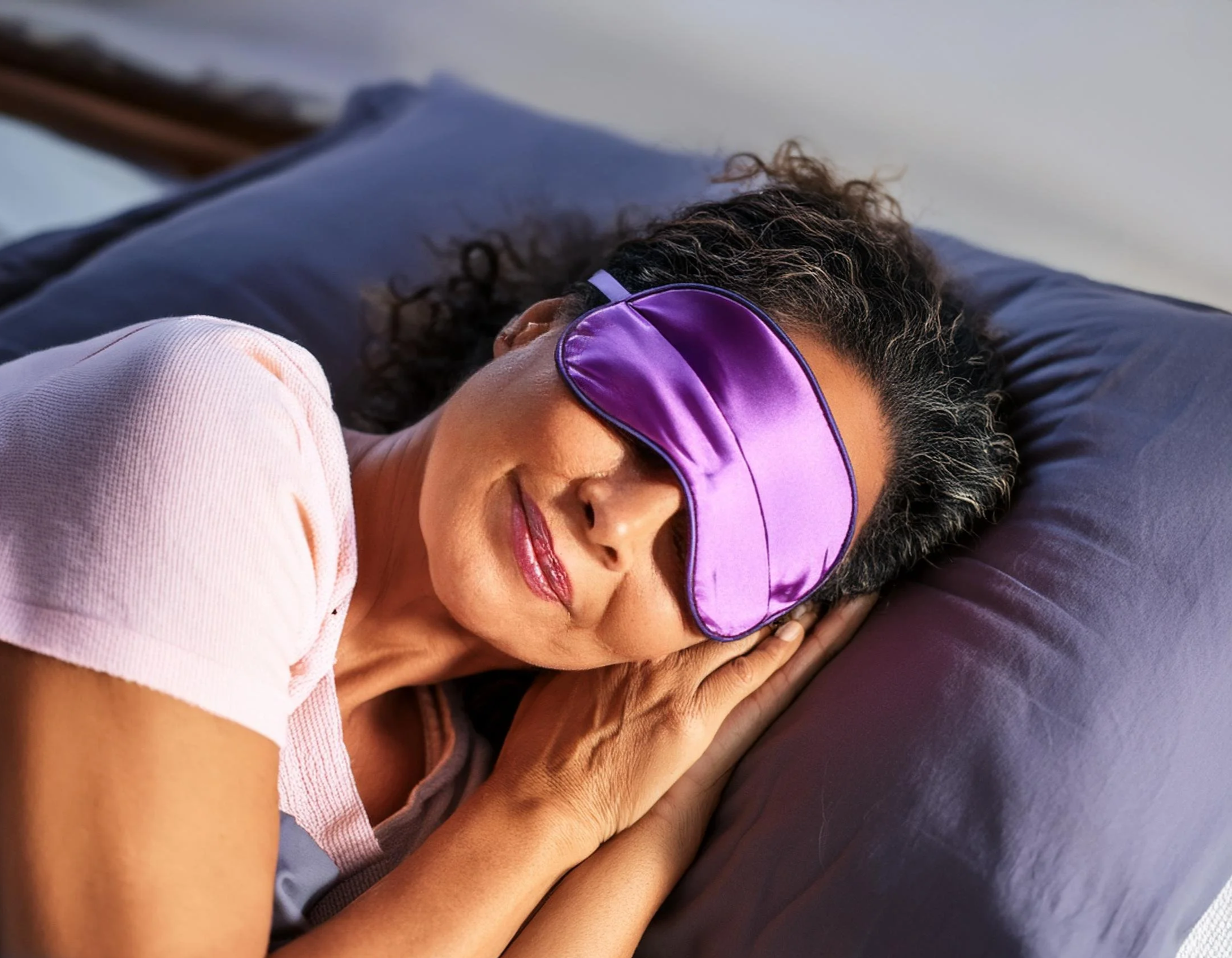The Hormonal Rollercoaster: How Estrogen, Cortisol, and Menopause Impact Your Sleep
Hormonal changes during perimenopause and menopause can wreak havoc on sleep. From declining estrogen to rising cortisol levels, this post dives into how these shifts affect your rest and offers simple tips to help you sleep better during this time.
Let’s talk about something that affects so many women but doesn’t always get the attention it deserves… how hormonal changes during perimenopause and menopause can mess with your sleep. I know firsthand that getting a good night's rest can feel impossible during this time, and it turns out there’s a solid scientific reason for this.
As we go through different stages of reproductive aging, our hormones shift in ways that can disrupt just about everything, including our sleep. This is especially true during perimenopause (the transitional years before menopause) and menopause itself. These hormonal changes, particularly with estrogen and cortisol, can affect our sleep quality in ways we might not even realize.
Estrogen: The Sleep Regulator
Let’s start with estrogen. Estrogen is one of those multitasking hormones that do so much for our bodies, and one of its many roles is helping regulate our sleep-wake cycles. When estrogen levels drop during perimenopause and menopause, sleep can become a lot more fragmented, meaning you wake up multiple times during the night or find it difficult to fall asleep in the first place. Studies show that lower estrogen levels are linked to more frequent awakenings and difficulty staying asleep (Lipovac et al., 2011).
But that’s not all. These estrogen fluctuations can also trigger hot flashes and night sweats, which further interfere with sleep quality (Utian, 2005). You know the feeling… waking up drenched in sweat and needing to throw off the covers, only to feel cold and uncomfortable moments later. This constant disturbance makes it hard to stay asleep, let alone feel rested the next day.
Hot flashes and night sweats aren’t just physical, they can impact our mental well-being too. The anxiety and frustration of waking up multiple times a night can lead to a vicious cycle of stress and even more sleep problems. It’s no wonder many women report increased levels of insomnia during perimenopause and menopause (Santoro, 2015).
Cortisol: The Stress Hormone That Won’t Let You Sleep
Now, let’s talk about cortisol, which is our body’s primary stress hormone. Cortisol is like the body’s alarm system. When we’re stressed, cortisol levels rise, helping us stay alert. But here’s the catch: when cortisol is elevated at night, it messes with our ability to relax and fall asleep.
This is especially relevant for women going through perimenopause and menopause. During this time, we often experience increased levels of stress and anxiety, which can lead to higher cortisol levels. Elevated cortisol interferes with the body’s natural sleep-wake rhythms, causing restless sleep, waking up too early, or even full-blown insomnia (Utian, 2005). You might find yourself lying awake in bed, your mind racing with worries and anxieties, while your body refuses to shut down for the night.
And it's not just about feeling stressed out. Studies have shown that women in perimenopause and menopause experience higher cortisol levels at night, which significantly impacts sleep quality. It’s a bit of a double-edged sword: poor sleep increases stress, and more stress makes it harder to sleep. The result? Daytime fatigue and that “running on empty” feeling that so many of us know too well (Sherman, 2005).
Perimenopause vs. Menopause: What’s the Difference for Sleep?
During perimenopause, our estrogen levels start to fluctuate, and these fluctuations can cause a rollercoaster of sleep problems. It’s not only about hot flashes or night sweats, though those are common. The inconsistent levels of estrogen affect how well we sleep in general. We may find it harder to fall asleep, wake up more frequently during the night, or feel like we just don’t get as much deep, restful sleep.
As we move into menopause, which is defined as going a full year without a menstrual period, estrogen levels decline even further. Many women continue to experience hot flashes and night sweats, but even beyond these symptoms, sleep disturbances often persist. Some research suggests that sleep problems can continue well into the post-menopausal years (Santoro, 2015). Depressed mood, anxiety, and insomnia can all be exacerbated during this stage, which can take a toll on overall health and well-being.
Long-Term Sleep Disruptions and Health Implications
The impact of sleep disturbances during perimenopause and menopause goes beyond just feeling tired during the day. Poor sleep can lead to a host of other issues, from mood swings and irritability to cognitive problems and an increased risk of chronic health conditions. For example, research has shown that chronic insomnia is linked to a higher risk of cardiovascular disease, obesity, and even Alzheimer’s disease (Santoro, 2015).
Additionally, prolonged sleep disruptions can worsen mental health conditions like depression and anxiety. As we already know, stress is a big factor here, and the relationship between stress, sleep, and hormonal changes is incredibly complex. This is why it’s so important for us to be proactive about managing our stress and prioritizing our sleep during this transitional time.
Strategies for Better Sleep During Perimenopause and Menopause
The good news? There are steps we can take to improve our sleep during these challenging years. Here are a few strategies that may help:
Establish a bedtime routine: Consistency is key. Going to bed and waking up at the same time every day can help regulate your body’s internal clock and improve your overall sleep quality.
Create a sleep-friendly environment: Keep your bedroom cool, dark, and quiet to minimize disruptions. Use a fan or cooling mattress topper if night sweats are a problem.
Manage stress: Incorporating stress-reducing activities like yoga, meditation, or deep-breathing exercises can lower cortisol levels and help you relax before bed.
Limit caffeine and alcohol: Both can interfere with your sleep patterns. Try to avoid them in the afternoon and evening.
Exercise regularly: Physical activity, especially earlier in the day, can promote better sleep at night. Just be careful not to exercise too close to bedtime, as this can sometimes have the opposite effect.
Talk to your healthcare provider: If sleep disturbances are seriously affecting your quality of life, it might be worth discussing hormone replacement therapy (HRT) or other treatments with your healthcare provider.
Hormonal changes during perimenopause and menopause can throw your sleep completely off balance. With estrogen declining and cortisol levels rising, it's no surprise that many of us struggle with insomnia, restless sleep, and frequent night awakenings during this time. The key is understanding what’s happening in your body and taking proactive steps to support your sleep.
By making small changes to your lifestyle and sleep routine, you can help mitigate some of these challenges and, hopefully, catch some more restful nights. Because let’s be honest, we all deserve to wake up feeling refreshed and ready to take on the day.
How has your sleep been affected during perimenopause or menopause? What strategies have you tried to improve your sleep quality? I’d love to hear your experiences - feel free to share in the comments below!
References:
Lipovac, M., et al. (2011). The Effect of Hormone Replacement Therapy on Sleep Quality in Postmenopausal Women. Gynecological Endocrinology.
Santoro, N. (2015). Perimenopause: From Research to Practice. The Journal of Women's Health.
Sherman, S. (2005). Defining the Menopausal Transition. The Journal of Reproductive Medicine.
Utian, W. H. (2005). The North American Menopause Society Statement on the Menopausal Transition. Menopause.



